May 16, 2025 | 10:35 GMT +7
May 16, 2025 | 10:35 GMT +7
Hotline: 0913.378.918
May 16, 2025 | 10:35 GMT +7
Hotline: 0913.378.918
According to the Sub-Department of Cultivation (Ministry of Agriculture and Rural Development), by the end of 2022, the total area of fruit trees nationwide reached 1.22 million hectares, with a total output of about 13 million tons, comprising over 50 tropical and subtropical fruit species.
In the Central Highlands and southern provinces, alongside traditional crops, durian and passion fruit have recently garnered special attention from farmers. Currently, the nationwide durian cultivation area has surpassed 112,000 hectares, increasing by nearly 30,000 hectares compared to 2021, accounting for 9.2% of the total fruit tree area in the country and ranking third after mangoes and bananas. Of the more than 112,000 hectares, around 55,000 hectares of durian are currently being harvested, yielding nearly 870,000 tons annually.
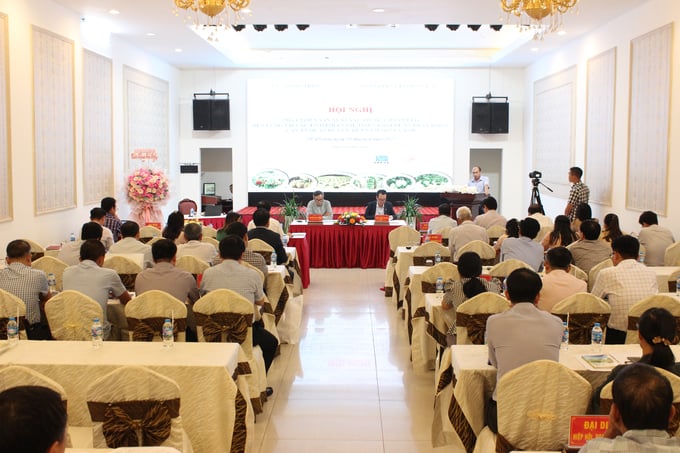
The conference was attended by a large number of agricultural management agencies, associations and businesses in the field of fruit production, processing and export. Photo: Dang Lam.
The Central Highlands is the leading region in durian cultivation nationwide with over 52,000 hectares. Among them, Dak Lak province takes the lead with 22,500 hectares, followed by the Mekong Delta region with 33,200 hectares, and the Southeast region with 21,500 hectares.
As for passion fruit, although it has been relatively recent since its introduction in Vietnam, it has already established a certain position within the market. Currently, the country has 9,500 hectares of passion fruit, yielding nearly 190,000 tons and falls into the group of 18 fruit types with an output exceeding 100,000 tons per year.
Similar to durian, the majority of passion fruit cultivation area is also located in the Central Highlands provinces, accounting for around 8,200 hectares. While durian is primarily grown in Dak Lak, Gia Lai province stands as the hub for passion fruit with approximately 4,500 hectares. In terms of passion fruit, Gia Lai not only leads in terms of cultivation area but also in attracting and concentrating investments from enterprises into producing varieties, processing, and consumption of passion fruit.
In Gia Lai, within an adequately short period, several major players have invested in the passion fruit industry, such as Doveco Gia Lai (under the Dong Giao Foodstuff Export Joint Stock Company) and most recently, Quicornac S.A. Company, which has established a processing plant in the Tra Da Industrial Zone (Pleiku).
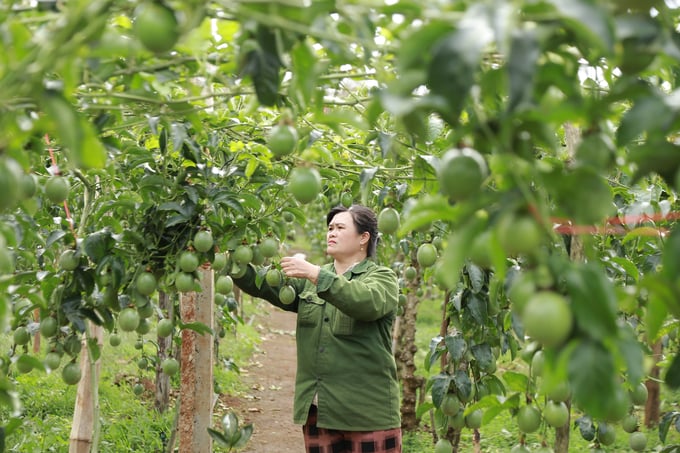
Fruit-laden passion fruit orchards in Gia Lai. Photo: Dang Lam.
In addition to the two units focused on deep processing and export as mentioned above, we cannot overlook a large-scale passion fruit seed production unit that has gained the full trust of passion fruit growers in the Central Highlands. This is the Red Pine International Joint Stock Company, with a high-quality plant seed production center covering a total project area of 120,000 square meters located in Ia Phang commune, Chu Puh district (Gia Lai). As of the current time, this unit is in the process of constructing its sixth greenhouse and is expected to be operational by the end of 2023, with a total capacity of producing over 20 million high-quality plant seeds per year.
Sharing at the conference, Mr. Nguyen Nhu Cuong, Director of the Sub-Department of Cultivation, stated that the fruit tree industry has made breakthroughs in recent times.
"To achieve over 5 billion USD in exports in 2023, we need to build along the value chain. The import markets of countries around the world have changed, which forces us to adapt; otherwise, we will fall behind. We also need to analyze the limitations of the fruit tree industry to make timely improvements. Specifically, we need to pay more attention to plant seeds, standardize care processes to achieve the highest efficiency," emphasized Mr. Cuong.
The issue of a "bursting growth" of fruit tree cultivation areas, especially for durian and passion fruit, was also of special concern at the conference. Mr. Nguyen Nhu Cuong expressed: "Currently, the rapid growth in area and production, especially with durian trees, may impact the production plan and the agricultural restructuring project of the locality. If we keep expanding the area rapidly as we are doing now, in 3 to 5 years, it will be hard to predict what will happen".
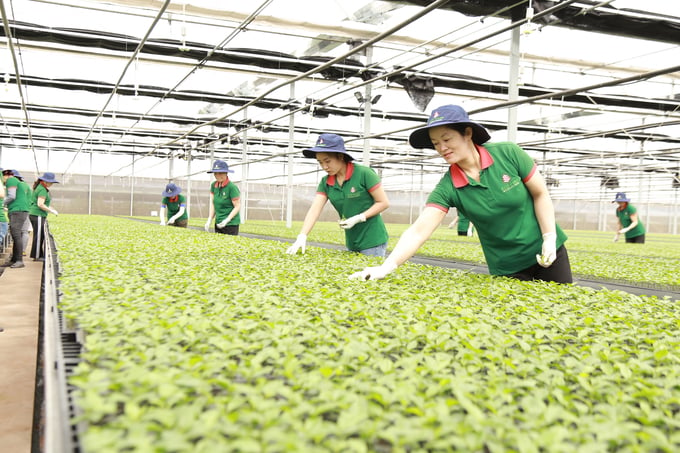
High quality passion fruit nursery of Red Pine International Joint Stock Company. Photo: Dang Lam.
"Localities should base their development on the conditions and actual situation to implement projects issued by the Ministry of Agriculture and Rural Development to have sustainable as well as foundational development solutions. These solutions should cover aspects from building standardized plant varieties, care processes, processing, production linkage, to product consumption. In addition, localities should restructure their cultivation to diversify products, avoiding the situation of "putting all eggs in one basket" which leads to multiple risks", suggested Mr. Nguyen Nhu Cuong.
For Vietnamese fruit products to gain a foothold and penetrate challenging markets like Japan, South Korea, the United States, and the EU, a prerequisite is to apply advancements in scientific and technical fields. This applies to every stage, from production and harvesting to processing and packaging of the products.
Regarding plant varieties, it is crucial to have clearly identified seedling nurseries that have been certified as the source of high-quality, disease-free plant varieties, similar to the passion fruit seed production center of the Red Pine International Joint Stock Company located in Chu Puh district.
In recent times, many localities have shown interest in selecting superior parent plants and establishing parent plant orchards for passion fruit and dragon fruit production. In Gia Lai, as of mid-September 2022, the Department of Agriculture and Rural Development of this province had recognized 50 superior parent plants of DONA durian and 100 superior parent plants along with 14 superior parent orchards for passion fruit.
Gia Lai has also established a three-level passion fruit seed production system within an advanced greenhouse network, ensuring disease-free plants on a large scale, with millions of high-quality seedlings produced annually by units such as Nafoods Company and the Red Pine International Joint Stock Company".
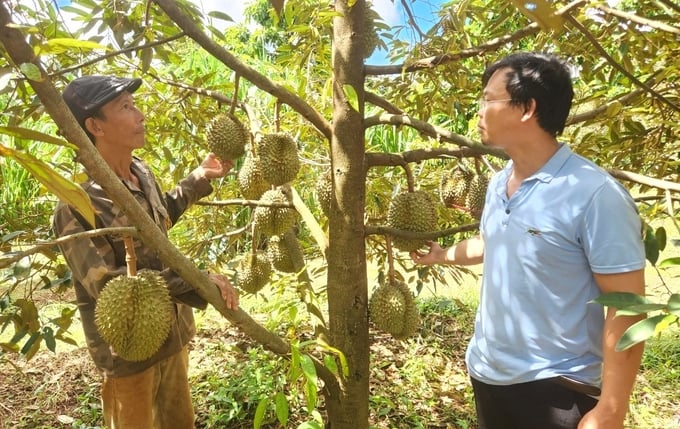
Durian has become a staple crop in the Central Highlands. Photo: Dang Lam.
In addition to plant varieties, the application of mechanization in water-saving irrigation is also crucial. Technologies such as drip irrigation and sprinkler irrigation are increasingly being used in production.
For durian trees, Tien Giang province leads with approximately 96% of the area utilizing mechanized water-saving irrigation. As for passion fruit, Gia Lai province boasts nearly 2,500 hectares applying advanced, water-saving irrigation technologies. Calculations show that water-saving irrigation can increase yields by 15-30% compared to traditional irrigation methods.
The use of bio-products in production, such as for manure treatment, enhancing the use of organic fertilizer, Trichoderma spp. fungi, and byproducts in durian production, has been thoroughly implemented to control harmful root fungi. In Tien Giang, the use of organic fertilizers covers over 90% of the area, Trichoderma spp. fungi accounts for more than 65%, and bio-pesticides constitute over 67% of the durian area within the province's project zone.
Additionally, the technique of intercropping durian has been widely applied, yielding high economic efficiency with practices such as inducing dry periods, using plastic covers, and applying Paclobutrazol to suppress growth. Observations from the durian nursery in Tien Giang show that intercropped durian yields higher economic efficiency than main-crop durian, ranging from 1.7 to 2.3 times more.
Good agricultural practices have been adequately emphasized and yield promising initial results. In Gia Lai, more than 2,900 hectares of passion fruit are subject to good agricultural practices. In this locality, there are also approximately 866 hectares of certified durian production meeting VietGAP and GlobalGAP standards.
Not only are advancements in scientific processes applied during production, but post-harvest processing and preservation for durian fruits have also made significant strides. Technologies like flash freezing (for whole fruits and whole segments) using liquid nitrogen have shown remarkable progress, providing convenient and highly effective preservation and consumption methods.
The prioritization of applying technical advancements throughout the production to harvest and preservation process for the fruit industry has garnered high praise from various localities and scientific communities, as highlighted during the conference.
Translated by Nguyen Hai Long

(VAN) Vietnam's draft amendment to Decree No. 156 proposes a mechanism for medicinal herb farming under forest canopies, linking economic development to population retention and the sustainable protection and development of forests.

(VAN) In reality, many craft village models combined with tourism in Son La have proven effective, bringing significant economic benefits to rural communities.

(VAN) The international conference titled Carbon Market: International experiences and recommendations for Vietnam was successfully held recently in Ho Chi Minh City.

(VAN) According to the Project on rearranging provincial and communal administrative units, in 2025, the country will have 34 provinces/cities, 3,321 communes, wards, and special zones, and no district-level organization.
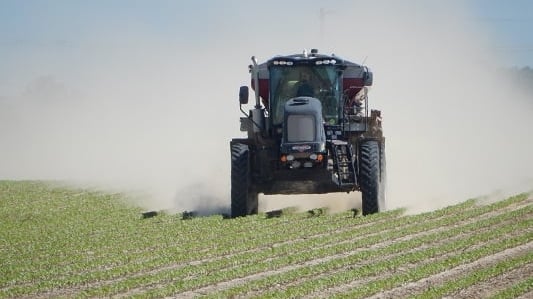
(VAN) The vice president of fertilizer with Stone X Group says the Trump administration’s tariffs are impacting fertilizer markets.
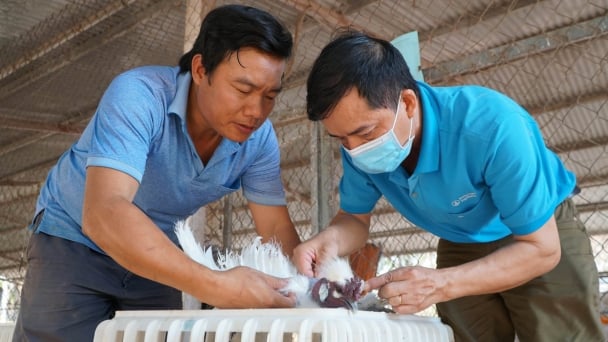
(VAN) Resolution 57 offers Vietnam a significant opportunity to narrow the global genetic technology disparity and convert its extensive genetic resources into commercial advantages.

(VAN) The Ministry of Agriculture and Environment will prioritize the implementation of five core and breakthrough solutions in science and technology, in addition to the seven groups of tasks identified in Decision No. 503.